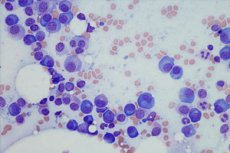Nye publikasjoner
Døgnrytmen kan brukes til å forbedre effekten av immunterapi mot kreft
Sist anmeldt: 02.07.2025

Alt iLive-innhold blir gjennomgått med medisin eller faktisk kontrollert for å sikre så mye faktuell nøyaktighet som mulig.
Vi har strenge retningslinjer for innkjøp og kun kobling til anerkjente medieområder, akademiske forskningsinstitusjoner og, når det er mulig, medisinsk peer-evaluerte studier. Merk at tallene i parenteser ([1], [2], etc.) er klikkbare koblinger til disse studiene.
Hvis du føler at noe av innholdet vårt er unøyaktig, utdatert eller ellers tvilsomt, velg det og trykk Ctrl + Enter.

Et tverrfaglig forskerteam ved University of California, Irvine, har funnet ut at døgnrytmer – en biologisk regulator som styrer de daglige rytmene til fysiologiske prosesser, inkludert immunfunksjon – kan brukes til å forbedre effektiviteten av kreftimmunterapi ved hjelp av kontrollpunktshemmere. Disse hemmerne blokkerer ulike proteiner som forhindrer binding til tumorceller, slik at immune T-celler kan ødelegge tumoren.
Studien, publisert i tidsskriftet Nature Immunology, forbedrer vår forståelse av de komplekse sammenhengene mellom døgnrytmer, immunregulering og tumorutvikling, og viser at en terapeutisk tilnærming som optimaliserer tidspunktet for legemiddeladministrasjon basert på individuelle døgnrytmer, tilbyr nye veier for forebygging og behandling.
«Forstyrrelser i døgnrytmen er en integrert del av det moderne samfunnet og kan bidra til økningen i ulike typer kreft. Vi fant at riktig regulering av døgnrytmer er avgjørende for å undertrykke betennelse og opprettholde maksimal immunfunksjon», sa hovedforfatter av studien, Selma Masri, assisterende professor i biologisk kjemi ved University of California, Irvine. «Å forstå hvordan forstyrrelser i døgnrytmen bidrar til sykdomsprogresjon kan føre til atferdsendringer som reduserer kreftrisikoen.»
Teamet brukte banebrytende teknikker for enkeltkjerne-RNA-sekvensering i en genetisk modell av kolorektal kreft og identifiserte døgnavhengige endringer som kontrollerer antallet myeloide celler som undertrykker T-celleaktivering. De fant at forstyrrelse av den interne biologiske rytmen i epitelcellene som strekker tarmen endrer cytokinsekresjon, noe som fører til økt betennelse, en økning i antallet immunsuppressive myeloide celler og kreftprogresjon.
Disse funnene viser at det å gi immunterapi på tider av døgnet når immunsuppressive myeloide celler er mest tallrike, øker effekten av checkpoint-blokade betydelig i behandlingen av solide svulster.
«Etter hvert som vi utdyper vår forståelse av den grunnleggende mekanismen for døgnregulering av immunitet, kan vi kanskje utnytte kraften i kroppens naturlige rytmer for å bekjempe kreft og utvikle mer personlige og effektive behandlingsstrategier», sa hovedforfatter av studien, Bridget Fortin, en doktorgradsstudent ved Institutt for biologisk kjemi ved University of California, Irvine.
Selv om denne studien representerer et betydelig skritt fremover i å definere døgnrytmen i kontrollen av antitumorimmunitet, mener teamet at fremtidige studier bør fokusere på å utforske ytterligere faktorer og celletyper som påvirker responsen på behandling med kontrollpunktshemmere avhengig av tidspunktet på døgnet.
Teamet inkluderte også studenter og fakultet fra UC Irvine School of Medicines avdelinger for biologisk kjemi, fysiologi og biofysikk, kirurgi og medisin.
